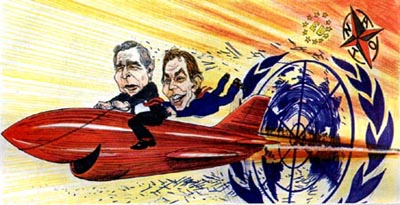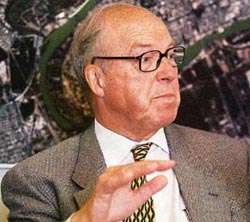 |
NEWS: April 11, 2003
Bird’s Eye View of the News
Atila Sinke Guimarães
SHADOW OVER THE UNITED NATIONS
– One of the interesting by-products of this war was that with their decision to send the ultimatum to Iraq, Bush and Blair put aside the United Nations. De facto they sent the message that they did not accept the UN as having the last word on international affairs.

Bush and Blair leaving behind the UN with their decision to go to war - The Tablet, March 22, 2003 |
As a civilized person, I understand perfectly that nations must have some international accords to govern their relations and establish general norms over the possibility for wars. The ensemble of these rules formed the old Jus Gentium [Law of the Peoples] and today forms the modern International Public Law.
But I do not think that the United Nations is entitled to represent this Iternational Public Law or to judge nations according to it. The UN is just a forum for debates operating under the empty presumption of running the entire world. It was founded as a second attempt to establish a utopic Universal Republic, after the League of Nations failed to keep the peace in the period between the two world wars. At the end of WWII, the UN took up the same objective.
I was not sad, therefore, to read about the energetic decision of Bush and Blair to go to war as rulers of sovereign nations without the bogus tutoring of the UN. There were practical reasons for that resolution. Since France, which had the decisive vote in the Security Council, opted to oppose the war plan, the final vote of the Council would have been 3-2 against the war: the three being Russia, China, and France, and the two being the U.S. and the U.K. Therefore, Bush and Blair were faced with this choice: either to be humiliated by Chirac’s veto and put aside the plans for war, or go ahead by themselves without the UN.
We know what happened. The war was made, and it is almost finished, Chirac was reduced to his proper stature, and the UN stayed in its corner quiet and well-behaved like a good girl waiting for her father’s word on what to do next. It is a useful snapshot to keep in mind. What does it signify? That when the U.S. wants, the UN stops. The rest is folklore.
ATOMIC AND CHEMICAL WEAPONS
– On April 9 Baghdad fell. On April 10 the U.S. Marines were already discovering serious signs of nuclear and chemical weapons that escaped the UN observers in their multiple investigations.
I have in front of me two April 10 dispatches of World Net Daily. The first, reproducing news from the Pittsburg Tribune, reports that Marines have located a complex of tunnels underneath a supposedly deactivated Iraq nuclear complex some miles south of Baghdad. The tunnels include a vast array of warehouses and bomb-proof offices that can contain the necessary evidence that Iraq was preparing atomic weapons. This suspicion was confirmed by a very high index of radioactivity detected on the site and some lethal nuclear residues.
Chief Warrant Officer Darrin Flick, the battalion’s nuclear, biological and chemical warfare specialist, said radiation levels were particularly high at one place near the complex. “It’s amazing,” Flick said. “I went to the off-site storage buildings, and the rad detector went off the charts. Then I opened the steel door, and there were all these drums, many, many drums, of highly radioactive material.” Commenting about what was found in the buildings, Flick said: “It’s going to take some very smart people a very long time to sift through everything here. All this machinery. All this technology. They could do a lot of very bad things with all of this.”
The second dispatch is also from April 10 and reports that Marines found a strange Iraqi truck that could be a laboratory for processing chemical weapons. Here are the words of Rick Levental from Fox News Channel, who is following the troops: “The inside of the vehicle was made to look like a radar truck. But the Marines noticed there was a fake wall inside. They opened up the side panel of the vehicle and inside they found what was described as a ‘safe space,’ a hidden area where there was an electronic pulley system.” With it was other laboratory equipment. “There was an area someone could use to manipulate hazardous, possible biological or chemical materials, to move it from one container to another,” he added. Leventhal said he was told it “fits the description of a biological lab.”
Will these two initial discoveries offer evidence to prove that Saddam Hussein was preparing weapons of mass destruction? I don’t know. So why I am citing them? Because there are other good symptoms along with these that indicate that such weapons exist. What are they?
To answer this question, let me go to a different order of argument, the argument of probability, not of certainty. I ask the reader the favor of following my reasoning:
- The American intelligence services are extremely efficient, and if these weapons exist, they found them before the war.
- President Bush and Prime Minister Blair are politicians, that is, men who depend on public opinion for their future political success. They would not risk their credibility and careers stating as loudly as they did that one of the principal reasons for the war was that Iraq has weapons of mass destruction if they had lacked the necessary evidence that such weapons in fact exist.
- Therefore, the most probable case is that there are such weapons. Bush and Blair are aware of them. But the stashes are very well hidden by Saddam Hussein and his partisans.
- Since Mr. Hans Blix, chief of the United Nations investigators, did not find anything in his many searches, the UN dreamed for a while it was powerful enough to curb the U.S. and the U.K. with the results from the Blix investigations.
- Bush and Blair played the diplomatic game in the ensuing UN discussions, but were unsuccessful.
- So, they decided to go to war by themselves. If they would win the war and prove that the weapons exist, they would have a colossal political victory that would gain them a lot of credibility for future UN discussions. For example, the needed credibility to suggest a war against Iran and Syria.

Hans Blix - Time, November 25, 2002
|
If the weapons are found, as I think they will be, what are the consequences for the UN, since it did not discover them? Again a shadow falls over the organization, but this time a heavier one, a shadow of suspicion. Was the UN also aware that the weapons were there and did it try to cover up their existence? Would this signify complicity with the Iraqi regime? Or would it simply mean that it naively trusted the successive reports of Mr. Blix?

Saddam Hussein - Time, November 25, 2002 |
If you analyze Mr. Blix’s photograph and evaluate his shrewdness, it is not difficult to figure out that he could have stayed in Iraq for one hundred years looking for weapons without finding anything, as Saddam Hussein moved them in different places and stood on laughing. Blix seems to be the perfect sort of man to be fooled by the agile Arabic astuteness.
With this, all the elements to end Act One of the drama are in place: the defeated villain Saddam, the blind investigator Blix, the naïve - or the accomplice - UN, the perfidious Chirac, and the two daring victors, Bush and Blair. Now we just need someone to find the weapons to move on to Act Two.
The analysis of this topic continues in Guimarães book War, Just War

|
News | Home | Books | CDs | Search | Contact Us | Donate

© 2002- Tradition in Action, Inc. All Rights Reserved
|
 |
|